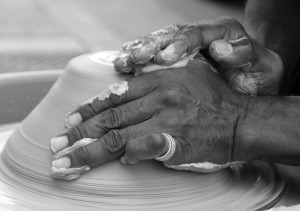From Your Minister
October 1, 2014Podcast: Download (7.8MB)
Subscribe: More
It was not a surprise when my mother died. Survival rates for ovarian cancer are not high, and hers was in stage four by the time it was diagnosed. Against those odds, she lived three years with a high quality of life.
Finally, when the experimental treatments could not stave it off any longer, she refused any more chemo and radiation, quit eating, and slowly let go.
REsources for Living
October 1, 2014Podcast: Download (5.8MB)
Subscribe: More
One way of defining religion might be as a place for talking about things that are hard to talk about. What does my life mean? Who or what is in charge? Where did everything come from? What do I owe to other people? What is good enough? How am I connected to the other beings of the planet as well as the other people? Why do bad things happen?
Offering for Grief
October 1, 2014The Challenge of Unitarian Universalist Theology
September 1, 2014Podcast: Download (15.5MB)
Subscribe: More
Some among us are asking, “Is there a center to Unitarian Universalism?” Or is it like the old story of blind persons describing an elephant, with a twist:
One of us touches the side and says, “It’s a wall.” Another feels the leg and says, “It’s a tree.” Another grabs the tail and proclaims, “It’s a rope.” But after all our surveying, is the one thing UUs can say for certain only that There is no elephant?
Do we have a theological center? And why are we asking about this? When did pluralism become a problem?
In Translation
September 1, 2014Podcast: Download (15.8MB)
Subscribe: More
We are people of the word. Or, better said, people of words, many words. Words are one of the most important ways that we “know” things.
But words, to quote Henry Adams, are “slippery things,” and words mean different things to different people. Take the word “freedom.” To the privileged early Unitarians, freedom meant freedom of thought. To the African American community, however, it meant freedom from slavery and freedom from oppression. The two groups had a hard time talking.
Saved
September 1, 2014I am paid to evangelize, to grow current congregations and plant new congregations. I’ve been lurking on internet sites of fundamentalist evangelists, because, quite frankly, they have systems for planting new congregations. I mean, they’ve got systems! They have trainings and boot camps and coaches and conferences just for planting. I have a hot case of holy envy.
So I thought about attending such a conference as an add-on activity in a city where I was already working on behalf of our Association. Well, attending it didn’t work out, but on the plane back home guess who my seatmates were? That’s right, two fundamentalist, evangelical men who had been to the church planting conference.
I strained my ears to hear what they were saying. The older man seemed to be in charge, and the younger one deferred to him. The elder quoted scripture and talked a lot about saving people. Their whole mission is converting people to Christianity so they may be saved and get into heaven.
I wanted to jump in, interrupt with all of the questions I had for them.
From Your Minister – September 2014
September 1, 2014Podcast: Download (8.1MB)
Subscribe: More
One of the ways that we create spiritual or theological common ground is so simple it’s almost embarrassing: We agree to do so. We make a commitment to each other to create a space that is held in common. In religious language, these commitments are called covenants. In the Bible, covenants are between people and God.
Covenants, if they are to truly hold us, need to be large enough to contain the whole selves of the people who make them (including both what is holy and what is unholy). The place we are most likely to see covenants being created is at weddings. Two people commit to one another before their loved ones and what they name as holy. I have seen people make some pretty unlikely promises over the years—promises that are romantic and beautiful, but in my mind fairly unsustainable.
We Covenant
September 1, 2014Podcast: Download (1.7MB)
Subscribe: More
Covenants are intentional.
Covenants are audacious.
Covenants are a promise
that can change our lives
together in this faith. Read more →
REsources for Living
September 1, 2014Podcast: Download (6.0MB)
Subscribe: More
As someone who grew up Unitarian Universalist, I have to admit that there are some disadvantages to being a UU kid. There are advantages, of course, like being able to celebrate holidays from a variety of different religions, but there are definitely drawbacks. Mostly these problems come when someone asks you, on the playground maybe, what church you go to. It’s hard enough just getting people through the ten syllables of Unitarian Universalist. But if you manage that task then the inevitable follow-up question is: “What do you believe?”
I happen to think that’s kind of an unfair question, especially to put on, say, a fourth-grader. If you say you’re Methodist or Baptist or Jewish nobody asks you what you believe. They have a category in their head to put you into, and they just leave it at that. Now, their assumptions about what you believe might be totally wrong, and I’m sure there is not one nine-year-old in 100 who could tell you the difference between what a Presbyterian and an Episcopalian believes, but the point is that no one feels they need to ask.
But if you’re UU there’s not only the long, awkward name to get through, there’s also the uncomfortable fact that people don’t know what mental box to put you in, so they ask about what you believe. Which leads you to the equally uncomfortable fact that your religion doesn’t tell you what to believe, which really messes with people’s idea of religion in general. And beyond even that, if you’re going to actually answer the question then you need to have figured out for yourself what it is that you believe, and how to say it, which is hard enough for a grown-up, and a real uphill climb for a child.
A Great Need
September 1, 2014Love Larger
We rely heavily on donations to help steward the CLF, this support allows us to provide a spiritual home for folks that need it. We invite you to support the CLF mission, helping us center love in all that we do.
Support the CLF
Can you give $5 or more to sustain the ministries of the Church of the Larger Fellowship?
If preferred, you can text amount to give to 84-321
Latest Spiritual Reflection Posts
Latest Quest Monthlies
Weekly newsletter
About
Quest for Meaning is a program of the Church of the Larger Fellowship (CLF).
As a Unitarian Universalist congregation with no geographical boundary, the CLF creates global spiritual community, rooted in profound love, which cultivates wonder, imagination, and the courage to act.







